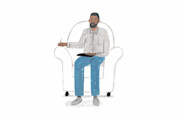Why are so many people going to therapy? Does it work and get results? And how does it work?
Let’s dig into the science-backed answers.
Therapy—also called psychotherapy, counseling, and talk therapy—is done through meeting with a licensed mental health professional to talk with them in a structured process in support of your overall emotional health and wellness.
Why are so many people going to therapy? Does it work and get results? And how does it work?
The goal of therapy is to improve your healing and wellbeing.
Talk therapy helps people with a wide variety of emotional and mental conditions and illnesses.
Therapy can alleviate or lessen symptoms (such as panic attacks), and it can also encourage an individual’s ability to cope with challenges of daily life including grief, trauma, and loss.
And, of course, therapy can also be an important part of treatment for specific mental disorders such as depression, avoidant personality disorder, anxiety, narcissistic personality disorder, and many more.
According to the Encyclopedia of Psychotherapy, therapy is a type of treatment in which “the thoughts, feelings, and behavior of a person are modified with the intention of facilitating increased functioning and life adjustment."
One of the most common questions about therapy, however, is how: How will talking with someone make a person feel better?
That’s, perhaps, a fancy way of saying your thoughts, feelings, and behaviors are heard and interpreted in order to offer suggestions for increasing your overall wellness and satisfaction with your life.
One of the most common questions about therapy, however, is how: How will talking with someone make a person feel better?
Read on, and we’ll address the research-backed reasons how and why therapy works—along with some of the most common reasons why people see therapists and an explanation of what to expect when you go to therapy.
Why do people go to therapy?
There's no wrong reason or bad reason to go to therapy.
Sometimes people go to help with stress, anxiety, depression, difficulty sleeping, or concentration issues.
Other times it’s because of relationship problems, experiences in childhood, coping with life changes, or coming to terms with a loss.
People may also go to therapy because they need to talk to someone outside their circle of friends and family.
“I went to therapy because navigating a new workplace and a new town as a new person was hard,” says Lupe*, a doctor who started her first job right before the pandemic hit, “I had no mentor—I needed to be strong for myself.”
At first, therapy didn’t work for Lupe. “My first therapist backed off from pushing me to the real things,” she says. “I think it was out of respect, but I needed someone to push me.”
Like many people (including Olympic runner Alexi Pappas), Lupe found that she needed to meet with a couple of therapists before finding the one that worked for her.
Finding the right therapist ensures you create the “working alliance”—the therapeutic connection between the client and therapist, as it’s called in The Basics of Psychotherapy: An Introduction to Theory and Practice.
The working alliance is the main reason why psychotherapy works.

How and why therapy works
According to the November 2019 findings of the American Psychological Association (APA) Task Force on on Evidence-Based Relationships and Responsiveness these factors of the therapist and client relationship were found to demonstrably enhance outcomes:
The working alliance. The relationship between the therapist and the client (as described in more detail below).
Collaboration. Understanding that you and your therapist are “on the same page.”
Goal consensus. Agreeing with your therapist on the goals and expectations of therapy.
Empathy. The therapist’s ability to understand your feelings and struggles and see from your point of view.
Collecting and delivering feedback to and from the client. Using feedback systems to gauge how you’re doing and using the information to tailor your treatment accordingly.
Positive regard. A great therapist will prize and support you—regardless of your behavior, attitudes or emotions.
Cohesion and a positive bond between group members (if you’re in group therapy).
What’s the working alliance?
A lot of research has been done to try to isolate why exactly therapy works and if there’s a particular type of therapy—such as cognitive behavioral therapy (CBT) or psychodynamic therapy that works the best.
Research finds over and over again that the type of therapy doesn’t matter as much as the relationship between the therapist and the client.
This is what is meant by the working alliance.
According to Encyclopedia of Psychotherapy, the working alliance refers to three important factors: the bond between the therapist and the client, their mutual agreement about goals, and their agreement about the tasks in therapy.
Most importantly, it refers to the client’s experience of empathy from the therapist.
“Therapy works because of the unique relationship between the therapist and client,” says Dr. Heather Bruschwein, PsyD, a clinical psychologist and assistant professor of psychiatry and neurobehavioral sciences at the University of Virginia School of Medicine.
“The therapist is focused on working with the client towards their goals in a collaborative, empathic and nonjudgmental environment,” she says.
If a client feels cared for and understood by their therapist, their symptoms will likely improve over time.

How to find the right therapist
Like Olympan Alexi Pappas, Lupe needed to meet with more than one therapist before she found one that worked for her.
Part of Lupe’s journey, oddly enough, included dog training. “I had a trainer for my puppy who was teaching me about helping my dog emotionally regulate,” she says. “We did breathing exercises, and it really helped!”
She realized finding a therapist who would teach her behavioral and mindfulness skills was important to her, and so that’s what she looked for in her second therapist.
For speech pathologist Mackenna, the most essential goals of therapy were, “to better understand myself, work through insecurities, and learn coping methods to help me untangle emotions and reduce anxiety.”
Mackenna was looking for a therapist she could feel safe enough with to let her guard down and be vulnerable.
It’s crucial to know if you’re going to feel safe with a therapist or believe they care about you.
That’s why it can be helpful to talk with a few therapists—perhaps book a free consultation to talk with them first, and/or go to sessions with more than one of the therapists on your list to see how you fit.

Start with an online directory of licensed therapists, like Monarch by SimplePractice, where you can filter results by insurance, specialty, and location.
Browse through therapists, and find out which ones might be the right person for you.
You can choose to browse therapists and counselors who accept your insurance.Each therapy provider’s page on Monarch lists their hourly fees directly underneath their areas of specialty.

Many therapists listed on Monarch also allow you to book telehealth video sessions in addition to in-person therapy sessions.
When you contact them, you may be able to book a free initial 15-minute consultation where you can learn about the therapist’s approach and get a feel for their personality.
Consider asking potential therapists these questions to help you evaluate each professional and their particular strengths, personality, and approach.
If the therapist feels like a good fit, schedule an appointment.
A strong alliance can be measured even in the first few sessions.
“I knew my second therapist was a good fit on our first appointment,” Lupe recalls.
Mackenna says she knew by the third appointment.
If you don’t feel like your therapist is a good fit for you by the third appointment, give yourself permission to try another therapist.
If the relationship doesn’t feel right—don’t force it.
Remember, that connection with the right therapist for your specific needs and personality is what will help you get better.
“There are many different styles of therapy, and therapists have different personalities,” Dr. Bruschwein says, encouraging clients to be patient and open to finding the right therapist. “It might take time to find the right fit for you.”
Dr. Bruschwein suggests you consider telling your therapist when something isn’t working. “Your therapist wants to help you, and she can do so more effectively when you share how the process is going for you.”
Communication is a necessary part of building a connection with your therapist—and that strong connection is what is going to help you get better.

What to expect in therapy
A therapy appointment is typically 45-55 minutes long, though it can depend on the therapist and whether they’re billing your health insurance, as insurance companies regulate how long appointments can be.
Often, a therapist’s theoretical orientation determines what the session looks like.
Psychodynamic therapists create a space for the client to talk without too much direction or problem-solving because the goal is insight-building.
DBT therapy is much more structured, and focuses on solving problems with skills and behavior change. Some therapists start a session silently, waiting for the client to begin, while other therapists pick up where the last session ended.
It can be anxiety-provoking to not have a clear idea of what therapy will look like, so it’s important to talk with a potential therapist during the consultation about what to expect— and to express what you think you need.
Remember, the alliance is made up of the bond, empathy, and agreement on goals and tasks.
You can tell your therapist what you need therapy to look like.

How long does therapy typically take to work?
In general, you can expect to be in therapy between two months to a year-and-a-half, but it’s OK if it takes less or more time than that.
Sometimes it can take a while to undo patterns that have been part of our lives for decades.
We may be accustomed to having a clearly-defined period of time from illness to recovery—and, consequently, we may expect a clear timeline from therapy too.
For example, when we take aspirin for a headache we expect we’ll likely feel better in about 20-30 minutes.
Similarly, when we take an antibiotic for a bacterial infection such as strep throat or a bladder infection, we know we’ll start to feel better within a couple days.
In comparison, it can be more difficult to accurately predict how long it will take for therapy to work for each individual.
The length of treatment before seeing improvement can vary greatly depending on the particular and specific reason the client is seeing the therapist and/or the specific mental health diagnosis.
With PTSD, for example, the APA cites research estimating “on average 15-20 therapy sessions are required for 50% of patients to recover as indicated by self-reported symptom measures.”
The length and number of treatment sessions can also be impacted by what’s going on in a client’s life.
Perhaps a client who went to therapy for depression has a life change that improves their quality of life, or maybe a client with anxiety experiences a traumatic event, which complicates their recovery.
Through the COVID-19 pandemic, some therapists noticed clients are staying in therapy longer as they cope with chronic stress and even what’s being called “COVID trauma.”
It’s also important to remember that therapy isn’t a one-and-done deal.
Returning to therapy after completing a previous round of treatment is perfectly normal.
“Therapy is a grounding place I can come back to in times of hurt, hope, and change,” Mackenna says. “It helps me be okay in times of distress—to appreciate the time between being uncomfortable and finding a solution.”
With all this in mind, therapy usually isn’t forever.
Therapy is a powerful tool to treat mental illness and help in times of struggle.
In most types of therapy, the goal is to teach the client to do for themselves what the therapist helps them do.
Additionally, therapists who bill health insurance have to keep in mind the concept of medical necessity, which means that they’re treating their client for a diagnosis, with a goal of resolving symptoms.
For some people going to therapy, they may not meet criteria for a mental health diagnosis, which means the therapist may not be able to bill insurance, and consequently therapy will be paid out of pocket.
“I learned through therapy that my value is independent of what I produce,” Lupe says. It allowed her to believe in her own worth—regardless of what she accomplishes.
“Therapy has helped me build safe, lasting relationships and contributed to my ever-growing confidence in myself,” Mackenna says. “Most importantly, it’s taught me that I am worthy of love.”
When the symptoms are resolved, therapy treatment ends.
And if you ever feel the need to return again in the future, therapy can be revisited as needed.

(*Lupe’s first name has been changed to protect her privacy. Mackenna is using her real first name.)
Would I benefit from therapy?
Answer a few quick questions in this 2-minute quiz to get your personalized recommendation.
READ NEXT: How to Prepare for Your First Therapy Session
Need to find a therapist near you? Check out the Monarch Directory by SimplePractice to find licensed mental health therapists with availability and online booking.
RESOURCES
[1] Lambert, M. J., Bergin, A. E., & Garfield, S. L. (1994). The effectiveness of psychotherapy. Encyclopedia of psychotherapy, 1, 709-714.
[2] Wampold, B. E. (2019). How does Psychotherapy work? In: The basics of psychotherapy: An introduction to theory and practice. American Psychological Association.
[3] Lambert, M. J., Bergin, A. E., & Garfield, S. L. (1994). The effectiveness of psychotherapy. Encyclopedia of psychotherapy, 1, 709-714.
[4] Wampold, B. E. (2019). How does Psychotherapy work? In: The basics of psychotherapy: An introduction to theory and practice. American Psychological Association.
[5] Lambert, M. J., Bergin, A. E., & Garfield, S. L. (1994). The effectiveness of psychotherapy. Encyclopedia of psychotherapy, 1, 709-714.







